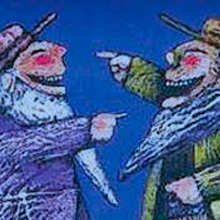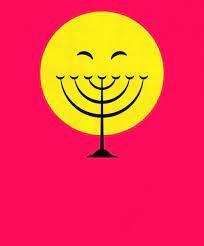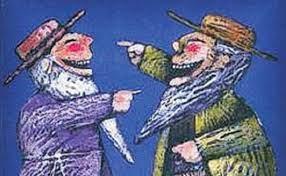
En 1978, el psicólogo Samuel Janus realizó un estudio que encontró que, aunque los judíos constituían sólo el 3 por ciento de la población estadounidense, el 80 por ciento de los comediantes profesionales del país eran judíos. El porcentaje de comediantes es menor hoy no porque haya menos comediantes judíos, sino porque en respuesta a los movimientos étnicos y de identidad de género, muchos comediantes nuevos provienen de grupos que antes estaban subrepresentados. Belle Barth, Danny Kaye y otros comediantes judíos sustituyeron el inglés por yiddish cuando querían engañar a los censores de habla inglesa con chistes subidos de tono.
En The Producers de Mel Brooks hay una obra dentro de la obra llamada “Primavera para Hitler”. Decenas de bailarines, cantantes, actores y pantomimistas de todas las razas y formas hacen una audición para el papel de Hitler. El número de producción de apertura del programa culmina con la formación de una esvástica que gira lentamente. Los pilares en la parte posterior del decorado se bajan a una posición horizontal y se transforman en cañones. Después de ver una extraña entrevista en la televisión, Reiner se volvió hacia Brooks y le dijo: "Tengo entendido que en realidad estuviste en la escena de la Crucifixión".
Brooks respondió: "¡Ooooooh, muchacho!" y luego continuó con carácter diciendo que sí, había conocido a Cristo. “Era un muchacho delgado, siempre usaba sandalias. Entré a la tienda pero nunca compré nada”.
Henry Spalding dice que gran parte del humor judío se presenta en forma de púas melosas dirigidas a las personas y las cosas que los judíos más aman. Los judíos atacan verbalmente a sus seres queridos y a su religión, pero con el mayor sentimiento de afecto. Sus chistes son “un beso con sal en los labios, pero un beso al fin y al cabo”. Dolf Zillman dice que el humor judío exhibe dos estaturas antitéticas: menosprecio y superioridad. Esta antítesis se puede ver en el siguiente chiste:
La Knesset israelí lamenta todos los desafíos que enfrenta Israel.
Un miembro de la Knesset sugiere que Israel vaya a la guerra contra Estados Unidos. Otros miembros dicen: "¿Qué?" "Una guerra así no duraría ni 10 minutos". "Lo sé. Lo sé. Pero entonces seríamos un país conquistado y los americanos nos enviarían ayuda. Construirían carreteras y hospitales y enviarían expertos en agricultura y alimentación”. “Pero”, dijo otro miembro de la Knesset, “¿y si ganamos?”
Los estereotipos judíos incluyen al astuto hombre de negocios, la madre autoritaria, la princesa judía estadounidense y el judío perseguido. Arthur Naiman ilustra el estereotipo de la madre judía autoritaria con una historia sobre un psiquiatra que le dice a una madre judía que su hijo tiene complejo de Edipo. La madre responde: "Edipo, Schmoedipus, siempre y cuando ame a su madre".
• El yiddish es el idioma del sarcasmo y la ironía. También es el idioma de la cultura judía. Las experiencias de Richard Fein fueron típicas:
• “El yiddish estaba en mis huesos, pero oculto a mi lengua. No conocía el yiddish como idioma, pero me sentí educado en su resonancia, tono y tono. Reconocí algunas palabras pronunciadas aisladamente, no capté nada de su estructura, pero me sentí bañado por sus ritmos. Aunque no hablaba yiddish, no era una lengua extranjera. Nunca lo poseí, pero sentí que me poseía a mí”.
Aquí hay una muestra de palabras y expresiones yiddish:
Bobehla: término cariñoso de “abuelita”
Chutzpah: descaro o descaro increíble
Ganeff: un ladrón o bromista travieso
Kibitz: bromeando
Mishmash: desorden o confusión flagrante
Nebish: un perdedor o un saco triste
Nosh: un refrigerio
Schmaltz: sentimentalismo de “grasa de pollo”
Schmear: sobornar o engrasar la palma
Schmooz: una visita sentida
Shlemiel: persona torpe o inepta
Shlep: llevar cosas (incluido uno mismo) de manera indigna
Shlimazl: chivo expiatorio o patán desafortunado
Shnorrer: un mendigo
En The Joys of Yiddish, Leo Rosten dice que la sintaxis yiddish también entra en el idioma inglés:
fantasía-schmancy
kvetch
maven- experto
Mazel Tov
tanz
¡Oy Vey!
Get lost.-Piérdase.
¡Deberías vivir tanto tiempo!
¿Quién lo necesita?
Debería disculpar la expresión.
No debería pasarle a un perro.
A él le queda bien.
Otros patrones yiddish incluyen virus schmirus y un verdadero no bueno.
(Este texto fue traducido al Español por by Google Translate)


Jewish humor
By Don L. Nilse
In 1978, psychologist Samuel Janus conducted a study which found that although Jews constituted only 3 percent of the U.S. population, 80 percent of the nation’s professional comedians were Jewish. The percentage of comedians is less today not because there are fewer Jewish comedians, but because in response to ethnic and gender identity movements, many new comedians have come from groups that were previously under-represented. Belle Barth, Danny Kaye, and other Jewish comedians substituted Yiddish for English when they wanted to fool English-speaking censors with risque jokes.
In Mel Brooks’ The Producers there is a play within the play called “Springtime for Hitler.” Dozens of dancers, singers, actors and pantomimists of every race and shape audition for the role of Hitler. The show’s opening production number culminates in the formation of a slowly turning swastika. The pillars at the back of the set are being lowered to a horizontal position and transformed into cannons. After seeing a bizarre interview on TV, Reiner turned to Brooks and said, “I understand you were actually at the scene of the Crucifixion.”
Brooks responded, “Ooooooh, boy!” and then continued in character saying that yes, he had known Christ. “He was a thin lad, always wore sandals. Came into the store but never bought anything.”
Henry Spalding says that much Jewish humor is in the form of honey-coated barbs at the people and things Jews love the most. Jews verbally attack their loved ones and their religion, but with the grandest sense of affection. Their jokes are “a kiss with salt on the lips, but a kiss nevertheless.” Dolf Zillman says that Jewish humor exhibits two antithetical statures: disparagement and superiority. This antithesis can be seen in the following joke:
The Israeli Knesset is lamenting all of the challenges that Israel faces.
One member of the Knesset suggests that Israel go to war against the United States. Other members say, “What?” “Such a war wouldn’t last 10 minutes.” “I know. I know. But then we would be a conquered country and the Americans would send us aid. They would build roads and hospitals and send food and agricultural experts.” “But,” said another member of the Knesset, “What if we win?”
Jewish stereotypes include the shrewd businessman, the overbearing mother, the Jewish American Princess, and the persecuted Jew. Arthur Naiman illustrates the stereotype of the overbearing Jewish mother with a story about a psychiatrist who tells a Jewish mother that her son has an Oedipus complex. The mother responds, “Oedipus, schmoedipus, just so long as he loves his mother.”
- Yiddish is the language of sarcasm and irony. It is also the language of Jewish culture. Richard Fein’s experiences were typical:
- “Yiddish was in my bones, but hidden from my tongue. I did not know Yiddish as a language, but I felt reared in its resonance, pitch, and tone. I recognized a few words uttered in isolation, grasped nothing of its structure, but felt washed in its rhythms. Although I could not speak Yiddish, it was not a foreign language. I never possessed it, but sensed it possessing me.”
Here is a sampling of Yiddish words and expressions:
Bobehla: “little grandmother” term of endearment
Chutzpah: gall or incredible nerve
Ganeff: a thief or mischievous prankster
Kibitz: kidding around
Mishmash: flagrant disorder or confusion
Nebish: a loser or sad sack
Nosh: a snack
Schmaltz: “chicken fat” sentimentality
Schmear: bribing or greasing the palm
Schmooz: a heartfelt visit
Shlemiel: clumsy or inept person
Shlep: carrying things (including oneself) in an undignified way
Shlimazl: fall guy or luckless oaf
Shnorrer: a beggar
In The Joys of Yiddish, Leo Rosten says that Yiddish syntax also enters the English Language:
Fancy-schmancy
kvetch
maven
mazel tov
tanz
Oy Vey!
Get lost.
You should live so long!
Who needs it?
He should excuse the expression.
It shouldn’t happen to a dog.
On him it looks good.
Other Yiddish patterns include virus schmirus, and a real no-goodnik.
